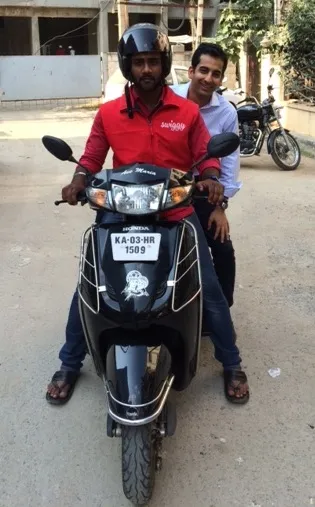Over a million app downloads, 8 cities and 5,000 restaurants - Swiggy’s 17-month journey from bootstrapping to closing 3 funding rounds
It has been a long day at work for Priya Kasturirangan. The last thing she wants do right now is cook food. But unlike a decade ago, she could order online or via her app and dinner is delivered at her doorstep.
Bootstrapped till last January, the foodtech startup was present in just a few neighbourhoods of Bengaluru, with Koramangala giving a major chunk of the business. Today, Swiggy has raised three rounds of funding and is present in eight cities across the country, with close to over a million app downloads.
Growing at 25 percent month-on-month, Swiggy has over 5000 restaurants on its platform that has 3,000 delivery boys. According to the RoC data filed by the company, the net worth of the company is Rs 3,86,34,590 with a turnover of Rs 7,41,702.
Currently, the team is working on enhancing its technology platform and building a stronger leadership team. With its Series-C round of funding, the team's focus this year will be on sustainability and profitability. In terms of city expansions, it is looking at metros more closely before touching Tier II and III cities.

Focus on service
There are a few guiding principles the team adheres to, no matter what– deliver food from the best restaurants nearby, deliver food with no minimum guarantee, and fast delivery. However, aware that service is the first thing that is sacrificed when a company tries to grow too fast, the founders decided to keep a close eye on it. This may explain why close to 80 percent of Swiggy’s orders come from repeat customers.
Sriharsha Majety, CEO and Co-founder, Swiggy, ensured he made the first 50 hires, to stress upon service and customer experience being the core values of the company. Even today, referral systems and background checks are in place.
On the importance of service and delivery time for foodtech startups, Sumer Juneja, Principal Norwest Venture Partners, says,
Food delivery in India is about delivering within 35 to 40 minutes. If you are unable to do so, then the company isn’t solving a consumer problem. So when you are growing you need to control delivery. If I can get food from close to 10,000 restaurants in 30 minutes, then you are truly offering great service and value.

Business with margins
Being a demand-and-supply business, the team at Swiggy works with what they can; if they end up having too many orders, they don’t take them. This, Harsha says, is to ensure that the quality of service remains consistent. Today, there are places where Swiggy has hit a delivery time that is less than 30 minutes.
When you look at the food business, there always is a decent margin. Harsha mentioned that when a restaurateur makes a sale, there is a margin of 65 to 70 percent on each sale, lending to a decent business model.
However, the number of moving variables increase in the food business. There is the restaurateur, the customer and the delivery angle that needs to be tightly managed. Mukul Arora, Principal, SAIF Partners, says,
When we were looking at the sector and different players in the space, we saw that Swiggy had a much stronger operating model in place and as a result the repeat behaviour from the consumers looked promising.
Aligning the vendors
Swiggy's technology has undergone incremental transformation with on-ground experience. In the beginning, Swiggy realised that the app and technology, while robust, needed to be better understood by the delivery boys. The tool is built in such a way so that the delivery boy understands where to pick and drop the order.
However, the task isn’t easy when you have over 5,000 restaurants on the platform who have to respond within a minute or a minute-and-a-half at most. But Swiggy has managed to deal with the different variables. Harsha adds,
Growth is about learning and evolving with the different variables and moving parts. It is making every part understand the customer experience guidelines and work in tandem. What really helps here is scale, if you are sure of the levels of business that is being given, tough discussions can take place.
He nevertheless believes that in the coming years, the number of orders a restaurant generates from Swiggy will outnumber the restaurant’s offline sales, especially in Bengaluru.
Expressing Swiggy
Currently, the team is focussed on the Indian market and at solving the Indian food delivery problem. It is also striving to find solutions to the supply problem. Swiggy, by virtue of the number of restaurants on the platform, is a very dinner-heavy business. Looking for more use cases in a day, the team is looking to diversify the supply. This gave birth to Swiggy Express, where food is curated by expert chefs.
Harsha adds that the quality of food here is different, part home-style, part gourmet. The team is looking to expand by broadening the availability and variety; and even shortening the delivery time to 20 minutes. “If the pricing, food and delivery can be scheduled the model can work,” adds Harsha. Swiggy Express currently is in pilot in parts of Bengaluru.
“Since the quality of service is high, the demand is good. If we want we can double our business in a month, but what is really is the ‘wow’ factor is that with the 5x and 6x growth in Swiggy has happened without much burn rate,” mentions Sumer.
The team aims Swiggy to be there for the customer all 365 days in a year, irrespective of holidays or working hours. Swiggy aims to be all-encompassing food delivery platform for every possible meal by restaurants, home-chefs, hotels, caterers and every possible food joint.
The greasy business of food
The second half of 2015 was dominated by problems faced by foodtech startups like TinyOwl, which scaled back operations, and Spoonjoy, which shut down operations and was acquired by Grofers. However, Swiggy’s is the fourth foodtech funding announcement of the year. FreshMenu, WIMWI and B9 Beverages raised funding in January.
These funding rounds show clearly that investors continue to have an appetite for foodtech. Indian consumers, especially in the metros, are increasingly relying on ‘non-home cooked’ food, which has given rise to the new crop of foodtech startups, which are offering everything from fresh meals prepared by home chefs to home-delivered ready-to-cook ingredients, apart from doing restaurant deliveries.








![[Funding alert] Ola Financial Services raises Rs 205 Cr from Matrix Partners, others](https://images.yourstory.com/cs/2/e641e900925711e9926177f451727da9/yourstory-Ola-opens-Ola-Money-to-other-ecommerce-1590560930663.jpg)
![[Funding alert] CpaaS startup CometChat raises $1.6M from US and Indian VCs](https://images.yourstory.com/cs/2/b87effd06a6611e9ad333f8a4777438f/Imageoxty-1597817824151.jpg)